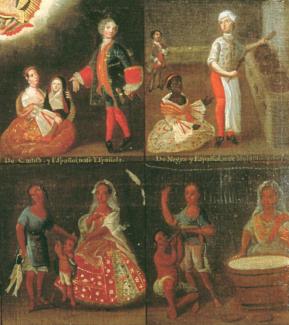
Ananda Cohen-Aponte - Replenishing Our Intellectual Deserts: The Place of Colonial Latin American Art in Academia and Beyond
Thursday, May 12, 5pm
CWAC 157
Simultaneous live stream available
In light of ongoing calls to decolonize our curricula, our fields of study, and our institutions, the importance of public-facing, nuanced conversations on the multiple, overlapping, and ongoing colonialisms in whose wake we live is all the more urgent. Further, the visual arts can play a critical role in demonstrating the ways that colonial institutions and discourses cohere in objects, while also providing opportunities for tracing artistic agency and resistance through innovative approaches to the visual record, from scientific analysis to expansive readings of the colonial archive. What can colonial Latin American art offer to this discussion? This presentation offers new frameworks for approaching colonial Latin American visual culture that places it at the interface of scholarly knowledge and social justice efforts. How can we cultivate new methodologies for approaching colonial Latin American art that do not sacrifice its historicity while also bringing the webs of coloniality, race, resource extraction, and land dispossession in which it is entangled into the realm of the present? These questions will be addressed through a discussion of a current research project at the Rocky Acres Community Farm’s bodega in Freeville, NY, in collaboration with co-creators Ella Maria Diaz, Jolene Rickard, and Sandy Rodriguez, which addresses intersecting histories of Indigenous, Chicanx, and colonial Latin American place-based knowledges and ontologies through the lens of the visual, textual, and performative arts
Ananda Cohen-Aponte is Associate Professor of History of Art at Cornell University who works on the visual culture of colonial Latin America, with special interests in issues of cross-cultural exchange, historicity, identity, and anti-colonial movements.
Her recent book, Heaven, Hell, and Everything in Between: Murals of the Colonial Andes (University of Texas Press, 2016) explores the intersections between art, politics, religion, and society in mural paintings located in colonial churches across the southern Andes. This work draws on a wealth of archival and primary source research to understand the ways that artists appropriated European religious iconography to articulate local narratives, transforming the medium of muralism into a powerful barometer of indigenous and mestizo life under Spanish colonial rule. She also served as editor and primary author of the book Pintura colonial cusqueña: el esplendor del arte en los Andes/Paintings of Colonial Cusco: Artistic Splendor in the Andes, published as separate Spanish and English-language editions (Haynanka Ediciones, 2015). Her essays appear in a range of journals and edited volumes, including Colonial Latin American Review, The Americas, Allpanchis, RES: Anthropology and Aesthetics, and Latin American and Latinx Visual Culture, among others. She is currently working on a new book project that explores the role of the visual arts in fomenting an insurgent imaginary in late 18th-century Peru and Bolivia within a context of inter-ethnic conflict and rebellion.
This convening is open to all invitees who are compliant with UChicago vaccination requirements and, because of ongoing health risks, particularly to the unvaccinated, participants are expected to adopt the risk mitigation measures (masking and social distancing, etc.) appropriate to their vaccination status as advised by public health officials or to their individual vulnerabilities as advised by a medical professional. Public convening may not be safe for all and carries a risk for contracting COVID-19, particularly for those unvaccinated. Participants will not know the vaccination status of others and should follow appropriate risk mitigation measures.
This lecture is presented by the Department of Art History as part of the 2021/22 Smart Lecture series supported by the Smart Family Foundation.
